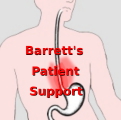Oesophageal Cancer
There are around 9,000 cases of oesophageal cancer in the UK diagnosed each year. It is the seventh most common cause of cancer death. The oesophagus is the food tube that links your throat to your stomach.
There are two main types of oesophageal cancer:
- Adenocarcinoma - about 70% of UK oesophageal cancer cases (but probably 60% in Scotland), with a male:female ratio of 4:1 It is on the increase. It is associated with Barrett's Oesophagus and the effects of stomach acid and contents on the lining of the oesophagus. So anything that increases acid reflux, like obesity, can be a factor. It is not particularly related to smoking (but smoking can relax the sphincter valve that normally stops stomach acid from rising into the oesophagus). It tends to occur lower down, towards the junction of the oesophagus and stomach.
- Squamous cell carcinoma comprises about 30% of the oesophageal cancer cases in the UK, but it is more prevalent in countries like Japan. It tends to be higher up towards the throat. The age profile is higher and this sort of cancer, in contrast to adenocarcinoma, is associated with high levels of tobacco and alcohol intake. If caught early enough, it can sometimes be successfully treated by chemo-radiotherapy and surgery.
What to look out for
Consulting your GP about persistent heartburn or indigestion is important. It is only a small proportion who will have Barrett's Oesophagus, and only 10% of those Barrett's Oesophagus sufferers will develop cancer. Do not worry needlessly; but persistent reflux is not normal and you should discuss the underlying causes with your doctor.
But Barrett's Oesophagus is a condition that is known to have a risk of cancer, and is a genuine early warning of potential trouble later; the earlier the doctors find cancer, the better your chances of successful treatment.
Apart from persistent heartburn, other signs that you need to look out for are:
- persistent indigestion or vomiting,
- persistent hiccups
- regurgitation of food
If you have any of the following problems:
- difficulty or pain in swallowing food
- food sticking in the gullet, or
- unexplained weight loss
go to see your doctor immediately, because this could be much more urgent than having Barrett's Oesophagus. There could, for instance, be a swelling in your oesophagus that is blocking the passage of food in to your digestive system. But do bear in mind that not all swellings and tumours are cancer! There might just as easily by some other reason that is far less serious than cancer.
Treatment for Cancer
If the cancer is found in time, the treatment may be one or more of options such as chemotherapy, radiotherapy and surgery.
Despite the daunting statistics there are many people who are successfully treated and who enjoy a good quality of life for many years after cancer surgery and other treatment.
We want more people diagnosed with this disease to have the benefit of successful treatment!
The National Oesophago-Gastric Cancer Audit is published each year and gives helpful details about cancer treatment plans, both in a full report format and in a version designed for patients and carers.
If you are diagnosed with cancer, your medical team will normally conduct a TNM analysis to determine what stage your cancer has reached. T stands for the tumour and how far it has reached through the walls of the oesophagus; N stands for whether lymph nodes have been affected, as these are important points in any spread to other parts of the body; M stands for metastatic spread to another part of the body. This process will take some time but it is important to clarify these factors so that the Multi-Disciplinary Team can work out the best treatment strategy.





















